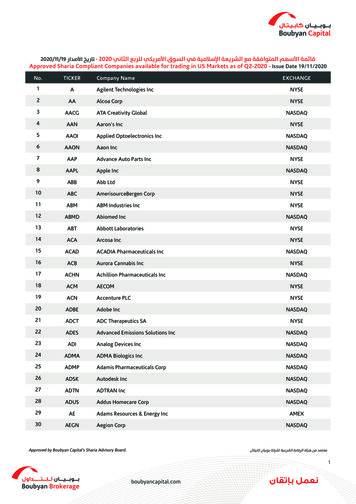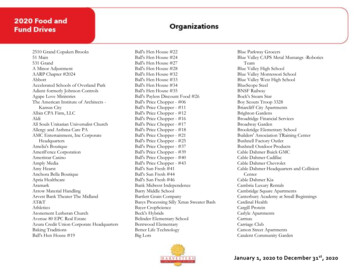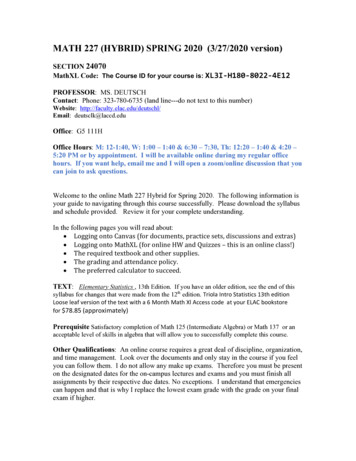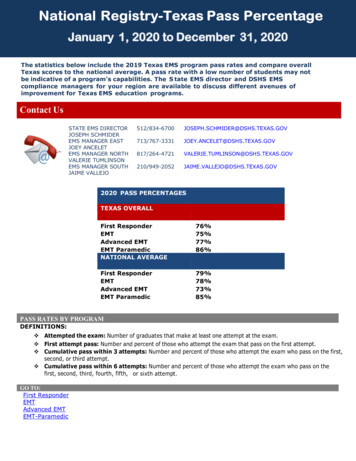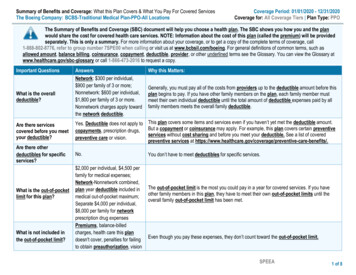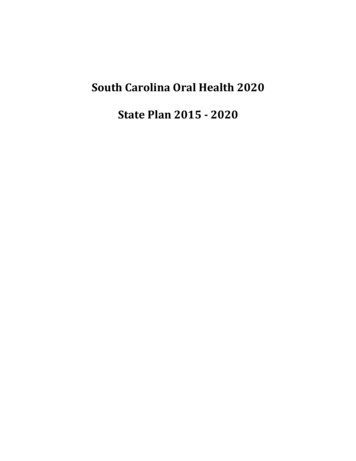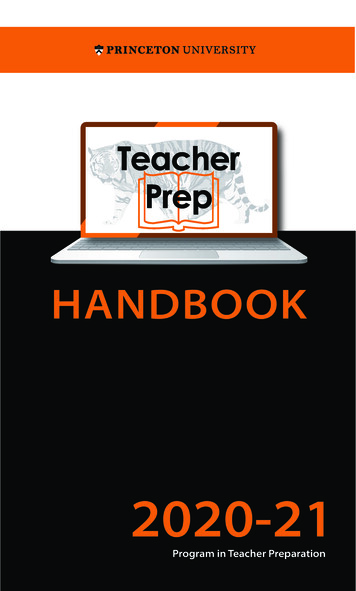
Transcription
HAND BO O K2 0 2 0 -2 1P r o g r a m in T e a c h e r P r e p a r a t io n
Mission3Program Goals 4Application Procedures 5Program Requirements 9ContentsGeneral Information23Fellowships 25Teacher Prep Initiatives27New Jersey ProfessionalStandards for Teachers28Teacher Prep Program Staff 302
The Princeton University Program in TeacherPreparation is dedicated to supporting members of our community who choose to servehumanity through education.We are committed to: Social progress through educationalopportunity and equity; Collaboration with partners and thecommunities we serve; and Inquiry and reflective practice. Provides learning opportunities that buildupon our candidates’ subject area expertiseand develop their theoretical and professional knowledge base using research on effective practices and accepted standards withinthe profession; Requires that candidates demonstrate theapplication of their acquired knowledge andskills in the classroom; Collaborates with a range of stakeholders tocreate and maintain a professional networkand integrated outreach programs that support our candidates’ learning and benefitour community; Assists candidates in their transition fromthe University to a professional environmentby helping them to find placements and offering support to them in their first years ofservice.MissionIn order to accomplish this and honor the passion, idealism, and commitment that studentsbring to Teacher Prep, the Program:“Education is the most powerful weapon which you can use to change theworld.”—Nelson Mandela3
The Program in Teacher Preparation:Program Goals1. Develops candidates who demonstrate thehighest standards of the teaching professionby promoting student-centered learning, fostering a deep understanding of their subject;and acting with care in promoting the successand well-being of all their students.2. Individualizes learning experiences, encourages reflection, and provides mentoringto support the variety of ways in which its candidates seek to apply the skills and attributesacquired while in Teacher Prep.3. Provides quality outreach and developmentprograms that benefit the communitiesthe Program serves and enhance the professional growth of its faculty, candidates andalumni.4. Works with other leaders in the field of education, University colleagues, program alumni, and associated partners to engage in andstrengthen networks that advance professional practice.5. Collects and analyzes data to inform decisions that support student and alumni growthand to ensure that the program meets or exceeds relevant standards and expectationswhile adhering to its specific goals and mission.6. Holds its participants accountable to program requirements. To that end, while participating in the program, University students willbe subject to all of the University’s policiesand requirements.4
Students are encouraged to apply early, during thefreshman or sophomore year. Juniors and seniors mayalso apply to the program, but they should consultwith a member of the program staff before submitting an application to ensure that all requirements canbe met. Upon acceptance to the program, students areassigned a Teacher Prep advisor to guide the studentin choosing their courses and completing the requirements for a teaching license. The program also offersa post-baccalaureate option for current graduate students and both undergraduate and graduate alumni.Undergraduates may earn the University certificate bytaking the first four program courses (PSY 307, TPP301, TPP 403, and TPP 404). Students who wish to earnthe NJ Certificate of Eligibility with Advanced Standing(CEAS), the state’s initial teaching license, must returnafter graduation and complete the full-time studentteaching courses (TPP 405 and TPP 406), complete theprogram’s Professional Portfolio, and pass the NewJersey State required assessments (the Praxis Core, thePraxis Subject Area Test(s), the edTPA, and an oral proficiency test for licensure in specified World Languages).Certification can be transferred to other states throughreciprocity agreements between those states and theState of New Jersey. The transfer of the New Jersey CEASmay require a state-specific test or specific course requirements stipulated by a particular state. Studentsinterested in being certified to teach in other states areurged to consult the department of education websitesfor the states in which they are seeking certification tolearn about the specific requirements of those states.Students also may consult with the staff of the Programin Teacher Preparation for information or guidance.Application ProceduresThe Program in Teacher Preparation offers PrincetonUniversity undergraduates, graduate students, andalumni the opportunity to earn the University certificate and, with the completion of additional requirements, the New Jersey Certificate of Eligibility with Advanced Standing, the state’s initial teaching license.The Program is accredited by the Council for the Accreditation of Educator Preparation (CAEP). Annualreporting measures regarding Program performanceand accountability are available on the Program’sWeb site. Teacher Prep also offers an Urban Specialization for students interested in urban teaching.5
Application ProceduresSupport of Graduateand Non-Program StudentsGraduate students are welcome to participate in theprogram while enrolled or as alumni. The program’sintroductory courses, PSY 307 Educational Psychologyand TPP 301 Seminar on Student Learning and Methods for Teaching, are open to any University graduate or undergraduate student who is interested inlearning about the field of P-12 education and wouldlike to gain experience in schools and working withstudents. The program can also offer students counseling for securing work in independent schools orfor graduate work related to the field of education.Graduate students who choose to earn the NJ CEASlicense must complete the University certificate requirements and the full-time student teachingcourses (TPP 405 and TPP 406), complete the program’s Professional Portfolio, and pass the State required assessments (the Praxis Core, the Praxis Subject Area Test(s), the edTPA, and an oral proficiencytest for licensure in specified World Languages).Graduate and non-program students are welcometo attend program events, including workshopson finding employment in the education sector.Application ProceduresThose interested in completing the requirements forthe University Certificate in Teacher Preparation and/or the NJ CEAS license must apply for admission tothe Program in Teacher Preparation. The applicationform is online and is typically provided after an initialinterview with the director or program staff member.The application includes an evaluation of “dispositions,” which reflect values and beliefs regarding teaching and learning. Research has shownthat teacher beliefs, such as holding high expectations for the performance of all students, can significantly influence student learning and achievement. For this reason, dispositions are part of theprogram’s evaluation framework at all levels of theprogram, including the student teaching semesters.To be considered for admission, students who begin6
the program as undergraduates must have a minimumGrade Point Average (GPA) of 2.75 at the time of application. The state requires that cohorts of admittedstudents have an overall GPA of 3.0, and students witha GPA below 3.0 may be denied admittance if their GPAlowers the cohort average below the 3.0 requirement.In order to be eligible for New Jersey CEAS license,students must have a minimum GPA of 3.0 at thecompletion of the Program.Students with a GPA below 3.0 at the completion of the Program, either undergraduate, graduate, or alumni, may still be eligible for certification if other conditions set by the State are met inregard to GPA and Praxis Subject Area test scores.The New Jersey State Department of Education requires all candidates entering a Certificate of Eligibilitywith Advanced Standing (CEAS) educator preparationprogram to meet the State’s basic skills requirementprior to starting coursework in the program. A candidate who demonstrates a score on the SAT, ACT,or GRE at or above the State cut score for the yearin which the exam was taken is exempt from taking the State required Praxis Core Academic SkillsTest. For information about the required cut score,please see the following New Jersey State Department of Education website: lsExemptionCutScores.pdfApplication ProceduresCurrent graduate students, as well as Princeton undergraduate and graduate alumni who choose thepost-baccalaureate option must provide an undergraduate transcript for review. Post- baccalaureatestudents must have an overall undergraduate GPAof 2.75 to enter the program (subject to the 3.0 cohort GPA requirement described above) and complete the program with a minimum GPA of 3.0 intheir post-baccalaureate coursework in order tobe recommended for the NJ CEAS teaching license.All applicants must provide a reference for their admission to the program. The reference may be aformer teacher, a current or former professor orcollege administrator, or any professional whocan attest to the student’s potential as a teacher.As a condition for teacher licensure, the State of New7
Application ProceduresJersey requires individuals to submit an Oath of Allegiance/Verification of Accuracy form that asks candidates to sign a statement supporting the U.S. Constitution and the N.J. State Constitution. The form alsocontains several background questions. Candidatesare provided this form at application to help determineif all requirements reflected in the form can be met.It is the candidate’s responsibility to inform the program if any change of status during their work in theprogram would result in their changing their responseto any question on the Oath of Allegiance form.Contact Dr. Todd Kent (twkent@princeton. edu) toobtain detailed information about the requirementsand to secure all application materials.SelectivityThe Program in Teacher Preparation is open to Princeton undergraduate students, graduate students,or alumni. Princeton University enjoys the honor ofworking with some of the world’s finest students, andTeacher Prep students reflect the academic excellenceof the Princeton student body as measured by overallGrade Point Average (GPA). Over seventy-five percentof eligible program students earn the ETS Recognitionof Excellence award, given to the top 15 percent ofPraxis test takers nationally in their subject areas.8
Areas of Certification andSubject Area Course RequirementsGeneral Education CoursesIn the liberal arts tradition, the program prepareswell rounded teachers who must complete coursesthat fulfill the program's “General Education” requirements. All students pursuing the University certificatein Teacher Preparation or those pursuing a NJ CEAS license must complete the General Education Courses.The General Education course requirements are allsatisfied by the Princeton University distribution requirements except for the area of Fine Arts.Program RequirementsThe Program offers students the opportunity to earnNew Jersey state subject area licensure that enablesthem to teach at the middle school (grades 6-8) and/or secondary school levels (grades 9-12) in the following academic areas: art, English, mathematics,music, psychology, the sciences (biology, chemistry, earth science, physics and physical sciences),social studies, and world languages. In addition tocompleting Program course requirements, studentsmust major in their area of certification or complete 30 credits or more (eight Princeton courses) ofa coherent sequence of courses in the subject areaas described below and pass the Praxis test in thatsubject area. Princeton undergraduates and alumnimay transfer up to two subject area courses (with aminimum of three credits per course) from anotherfour-year accredited institution provided they earna grade of 3.0 (B) or higher in each course (this restriction does not apply to graduate students). APcourse credits may be used for course requirements if the credits are recognized by the University.The Fine Arts requirement may be satisfied by takinga course in creative writing, dance, film, music, theater, visual arts, and selected courses from the Department of Art and Archaeology as determined bytheir Teacher Prep advisor.Students may use the pass/D/fail option for coursessatisfying the Fine Arts requirement and other General Education courses that are not used for subjectarea certification.9
The General Education areas are:Program Requirements Humanities: includes courses in literature, philosophy, religion, comparative literature, foreignlanguages, the Classics, and any course in theDepartment of English (this requirement is fulfilled by meeting the University General EducationRequirements); Mathematics: can be satisfied by the University’sdistribution requirement for Quantitative Reasoning (QR); Science: includes courses in the sciences, engineering, and psychology (this requirement is fulfilled by meeting the University General EducationRequirements); Social Sciences: including history, economics,politics, sociology, anthropology, and relatedcourses (this requirement is fulfilled by meetingthe University General Education Requirements).Program Requirementsand Certificate CoursesProfessional education course requirements are subject to change, pending regulations approved by theNew Jersey State Department of Education.Students may earn the University program certificateby completing the program’s Introductory Practicumand the four courses listed below.Students are required to complete 50 hours of clinical work in schools prior to beginning the TPP 403and TPP 404 student teaching courses. The required50 clinical hours are completed by fulfilling the requirements for the Intro
Current graduate students, as well as Princeton un-dergraduate and graduate alumni who choose the post-baccalaureate option must provide an under-graduate transcript for review. Post- baccalaureate students must have an overall undergraduate GPA of 2.75 to enter the program (subject to the 3.0 co-hort GPA requirement described above) and com-
